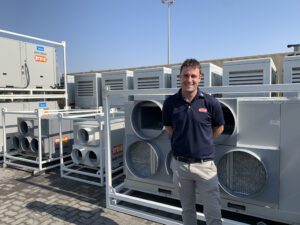HVAC contractors and rental suppliers used to be clear-cut domains, but not anymore, says Brian Marshall, Business Manager Climate Control, Byrne Equipment Rental, adding that the new situation has reduced the number of entities involved in the supply chain of temporary equipment. Excerpts from the interview he gave to Surendar Balakrishnan of Climate Control Middle East…
What is the scope of Byrne Rental’s work in the new normal?
The latest trend in the HVAC rental market is that customers are expecting more from their rental service provider. Over a decade ago, the rental service provider would receive a call from a contractor, such as the MEP contractor or facilities manager, and request a ready made HVAC solution. In recent times, the customer expects the rental service provider to visit their site and design a bespoke solution based on the conditions, temperature requirements and heat-loads. Customers want the best solution with the lowest cost in terms of rental rate and energy consumption. If generators are required, diesel consumption becomes a major factor in the design of the HVAC solution.
At Byrne, we have listened to our customers and added specialised business verticals, such as HVAC, to our core fleet solutions to ensure that we can provide the full solution to meet their needs. This has blurred the lines between a typical HVAC contractor and rental supplier and has reduced the number of people and companies involved in the supply chain for temporary equipment.

Brian Marshall
Are capital-cost-averse developers and owners reaching out to you more than ever for their buildings, as an alternative to buying new equipment?
In the past few years, we have seen a substantial increase in the demand for rental, as opposed to the purchase of assets. Rented equipment enables businesses to see if different machines deliver the expected payoffs; and if they do, representatives can make decisions later about whether to purchase them or not. In addition, used equipment is often made available with the latest software updates and kept in good condition, making the not-quite-new options appealing to firms that want to stay competitive while saving money.
HVAC rental industry can be seasonal and, therefore, rental can be the best option. Events and O&G shutdown occur during the cooler months, while worker welfare, logistics and internal fit-outs are required in summer. There is a strong business case to rent equipment when the requirement is seasonal, such as seen in the HVAC industry.
Have there been any healthcare-specific existing projects you have rented equipment to?
Our HVAC solutions can be provided in many aspects across the medical field, inclusive of:
All our HVAC product offerings are supported with ablution and sanitation facilities as well as power products and fuel, if required.
Overall, how is the outlook of the climate control rental market for the GCC region?
On the sector side of the market, the event sector has remained quiet this year with lockdown and social distancing regulations, but we are seeing a positive recovery in Q3/Q4 of this year, particularly in UAE and Saudi Arabia markets. The O&G sector has seen increased activity, as the planned maintenance projects commence and the backlog of delayed scheduled shutdowns must be executed and cleared. On the equipment side, we are providing more hybrid solutions that include all project lines, to ensure the most cost-effective solution is provided that meets the required parameters. Split air conditioning units might be used for smaller areas and office spaces versus chillers and air-handlers for larger spaces, such as warehouses. Site conditions are also an important factor when deciding on a centralised or decentralised approach to cooling systems. Due to these initiatives, the CO2 reductions are significant and a much valued consideration by our clients when assessing our suitability for tendered works.
What are you doing as a rental company to support the cause of energy efficiency? With the UAE releasing a new set of nationally determined contributions, in line with the Paris Agreement, to lower emissions, what is Byrne doing to help the country achieve its targets?
Byrne has a long history in the power industry in the GCC, and we have in-house application specialists and electrical engineers that are always looking at solutions to reducing energy consumption. On the HVAC side, Byrne started looking at “smart systems” in 2020 and ran a prototype in our yard in Dubai. This included having sensors connected to the controllers of cooling equipment, which could monitor the supply and return temperatures along with the ambient temperature.
We are able to monitor all equipment dispatched to project sites. This information can help us monitor the performance of the equipment, review and capture customer loads profile as well as identify system issues and take corrective action, such as insulating the ducting system and adding more return ducts.
This can help to reduce the number of trips that our service teams are required to make to project sites, working towards reducing the carbon footprint and vehicle emissions. This project offering is being fine-tuned for all applications, and we are always looking for ways to offer solutions that help reduce energy consumption and provide a greener solution while also reducing energy costs.
Copyright © 2006-2025 - CPI Industry. All rights reserved.